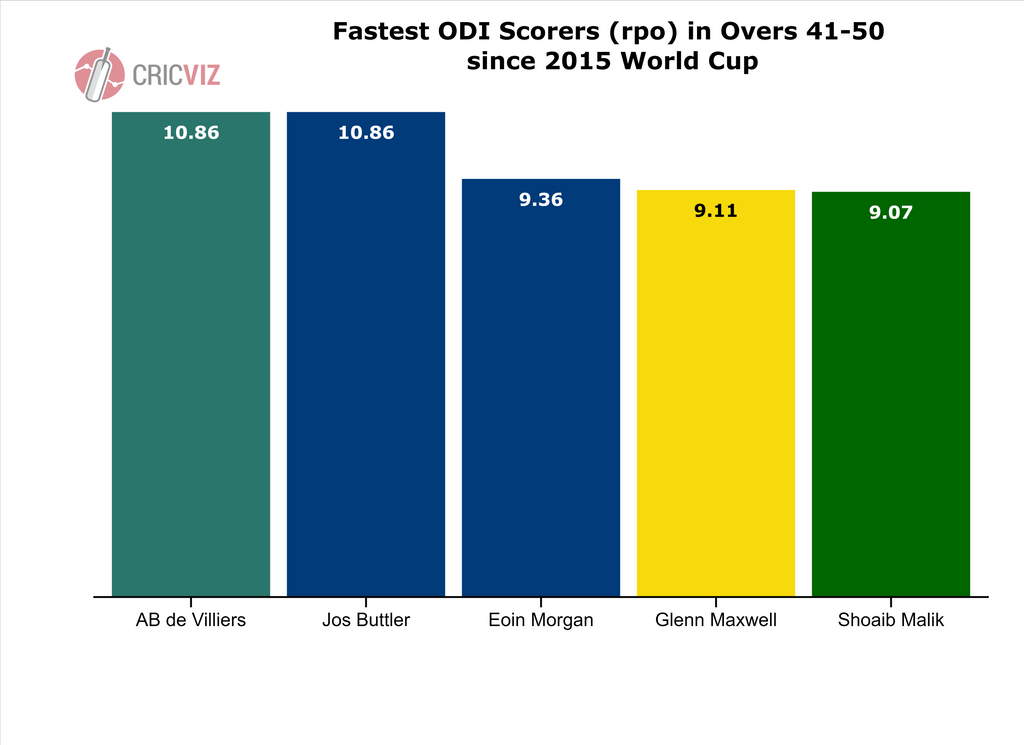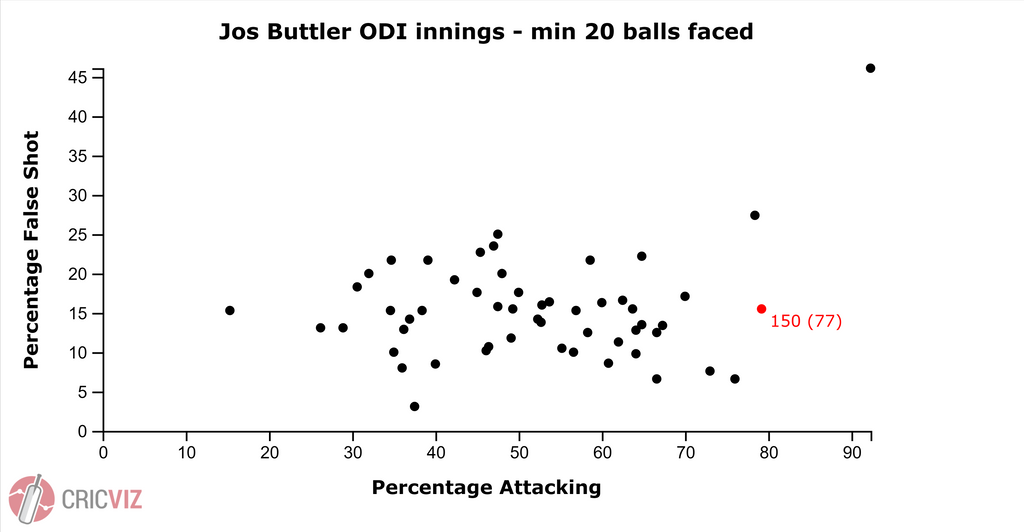
CricViz’s Ben Jones analyses another dazzling century from England’s unparalleled white-ball star.
There’s a moment, just after a batsman has hit a ball in the direction of the boundary, when your eyes are dancing. They are trying to assess the trajectory of the ball, to predict whether it will fall short or fly over the rope, whether it will land into the hands of fielders or fans. You are using all of your accumulated knowledge of the game, everything you have seen before, to predict what is possible.
When the ball comes off Jos Buttler’s bat, your eyes are dancing – and they don’t stop. All of that accumulated knowledge is worthless, because Jos Buttler doesn’t do what you’ve seen before. When other batsmen flick their wrists at a 90mph yorker, the ball arcs up, before diving down, safe in the hands of the man at mid-on. When Buttler does it, your eyes dart to find the ball dropping out of the sky, but it’s already over the rope, off on its own trajectory over the heads of the men in maroon, off for another maximum. Your eyes can’t fully take it in. Jos Buttler does things that your mind can’t comprehend.
Today, he hit new heights. The 150 (77) he managed today was his seventh century in ODI cricket, and was arguably his most accomplished. He came to the crease in the 27th over, just after the halfway mark and with a clear job to do – restart the chaos. 105 runs in the first 15 overs had slowed to 58 in the next ten. Hardly sluggish, but representing a clear dip in England’s charging progress. He accompanied his captain over the next 15 overs, ticking over the strike as Eoin Morgan continued his rich form. As the 40th over finished, Buttler had faced 42 balls for his 45 runs. His innings had shown glimpses of the usual Buttler brilliance, but there was little to suggest quite was about to occur, this particular knock destined to be played in the slipstream, following closely behind a more spectacular performance. It was reasonable to question, given how Morgan was going at the other end, whether Buttler would face enough deliveries to reach his hundred.
Then, in a mad flurry of 11 boundaries in 11 balls, Buttler wrestled back star billing from his skipper – and rendered that question ridiculous. His scoring rate shot through the roof, the direct consequence of an increase in attacking intent that you rarely see outside of a long-abandoned run-chase.

Of course, the way that Buttler went through the gears shouldn’t surprise anyone. Since the 2015 World Cup, no man scores more quickly than Buttler in the death overs. The only man to match his ability has retired from the international game, with no worlds left to conquer.

That acceleration left its mark. Of all the innings where Buttler has faced at least 20 deliveries, this was his second most attacking. An astonishing 79.2% of his shots were attempts to hit boundaries, a figure only beaten during the 90* (51) he made as England smashed the world record against Pakistan in Nottingham, back in the summer of 2016. When Buttler hits his stride, so do England.
What’s even more remarkable about today, compared to that innings at Trent Bridge, was the efficacy of those attacking shots. At Nottingham, when Buttler was tasked specifically with seeing England beyond that record total, he played 46.1% false shots – a figure that under normal circumstances would be a cause for concern. Of course, the situation dictated that he go wild, and he dutifully did, but in Grenada today he played just 15.5% false shots. That’s only marginally above the average for Test cricket. Buttler was going berserk, trying to hit almost every ball to the rope and yet, astonishingly, he wasn’t losing control. This was a white-ball gun at the peak of his powers, a boundary-hitting machine operating on a different level to what most of us thought possible.

It was an innings skewed in the direction of the seamers. Despite some moments of beauty against the slower bowlers – a pick-up off Bishoo over midwicket for six was remarkable, given the leg-spinner had dropped all of 20cm short – the real carnage came against the quicks. Carlos Brathwaite in particular took some serious treatment, with Buttler scoring 44 runs from the 15 balls he sent down.

Eoin Morgan got some criticism for his refusal to bowl Adil Rashid to Gayle whilst the left-hander was well-set earlier in the series, and Jason Holder left himself open to similar criticism today. Whilst Bishoo’s economy of 10.75 is knee-tremblingly poor, against Buttler that dropped to just 6.92. For the leggie to bowl only four overs given those returns, was a mis-step.
Especially when you consider that for the seamers there was no obvious plan of action. Hitting a good length was the most economical option, but that was saying very little – on this ground, you were on a hiding to nothing regardless of where you landed it.

As with so many white-ball centuries, the importance of the contest and the result began to fade. As the ball was crashed around in those last ten overs, one’s instinct was not to think of the game situation, but to marvel at the individual brilliance on show and to wonder quite how far it could go.
That is the luxury of a bilateral series. Obviously England wanted to win this series, and their record of steamrollering opponents in these contests is a source of pride and momentum, but ultimately there’s no deeper consequence to this win. This is going to change in a few months time, as the World Cup takes centre stage in the British sporting summer. Tension will mount in every match, every swat across the line a little more nerve-wracking than the last, and fear could well return to all but the most unique batsmen. It’ll change the way England’s batsmen play.
Apart, it seems, from Buttler. Because here is a player who has always attacked, always taken the game to new levels, and rarely shown signs of losing his nerve. Buttler is a player to transcend the cricket bubble; he is the sort of player, defined all that by flair and aggression, who appeals to the general sports fan as much as the cricket fanatic. In all senses, he is an easy player to love.
As such, the story of England’s summer is likely to be the story of Jos Buttler. Both him and the ODI side as a whole have been stunningly good for four years now, but the nature of cricket’s position in the national consciousness means that Buttler and co are given brief, sporadic moments to take centre stage. This summer is not the ultimate test of whether they are a great side – the last four years have shown that they are. But it will be the ultimate opportunity for this side, for Buttler, to impress upon the wider public quite how special they are.








